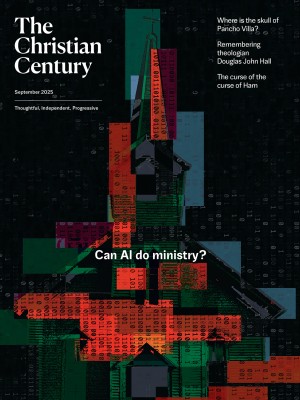In prison, Satan is real
I’ve heard incarcerated women preach about a power that demands renunciation.

Photo by Instants / E+ / Getty
On a bright, blue morning, I turn to the five baptismal candidates standing on the bank of the river and ask them to confess their faith. “Do you renounce the evil powers in this world?”
Our hymnal includes this liturgical innovation, a departure from 2,000 years of Christians, prior to their baptism, renouncing “the devil and all his works.” My tradition is not alone in exorcising the name of Satan from the baptismal confession. Today, the liturgies of most mainline churches reflect a modern interpretation that turns Satan into a metaphor for sin and chaos.
I understand why modern Christians would want to leave behind notions of angelic beings engaged in a cosmic war, beyond the horizon of human sight. I am troubled when Christians blame catastrophe on a demonic presence rather than on the evil constructed by flesh-and-blood human beings. Over the centuries, Satan has been a convenient explanation for the discomforting and nonconforming, from mental illness to queerness. Medieval Christians polemicized that the Jews were “the children of Satan,” unleashing conspiracy theories, pogroms, and genocides that haunt us to this day.
Read our latest issue or browse back issues.
For these reasons and others, Satan-talk has fallen away in most of my religious circles. But there is one place where I often hear about the devil with consistency and fervor: the state prison where my church leads worship.
Often volunteers from local churches preach at the women’s prison, but not long ago, on one special Sunday, two students from a preaching course offered through Duke Divinity School entered the pulpit. Both incarcerated preachers attested to cosmic forces at work in and through the prison walls. Their decades of experience behind brick and barbed wire couldn’t be explained solely through the language of personal responsibility and bad choices.
When civil rights activist Benjamin Chavis was sentenced to 23 years for arson—only to be exonerated due to prosecutorial misconduct—he encountered a wickedness that defied rational categories. Today he sees prison as “the institutionalization of dehumanization for profit, for vengeance,” as he said at a recent lecture at Princeton Theological Seminary. When mothers are kidnapped off the streets by immigration agents, when we hear their screams as they are dragged into unmarked vehicles, when we learn of children deported away from their cancer treatment centers to countries they have never known, we are operating in the realm of a cosmic force at war.
Rowan Williams reminds us that the devil is not “a convenient metaphor for extreme wickedness or even for the acute sense of meaninglessness.” Nor can we cast blame for the troubles of this life onto a supernatural being. “The intolerable fact,” writes Williams, “is that we meet the really alien in what is really human.” How do we live with this terrifying prospect of iniquity? We entrust ourselves to the God who has defeated Satan once and for all, this Jesus into whose life we are baptized. “Whatever is in me and in the human world,” says Williams, “God has seen, known and taken to himself in Jesus who descended into hell.”
At the women’s prison, the incarcerated preachers testified to the distractions and destructions lurking around their attempts at recovery and change. But they also named the works of Satan that separated them from their children and disappeared them from public life. One incarcerated woman noted where she saw the devil choking out the seeds which bear the fruit of the Spirit. “How can anything grow in this poisoned ground?” she wondered aloud, gesturing to the guards and the locked gates. The good news of Jesus Christ, she told us, is that the Spirit’s work is greater than even this.
The preachers’ words plunged me into the cosmic drama, in which baptism is a central defining act. David Bentley Hart points out that for the earliest Christians, baptism was neither the initiation of children into the church nor the confirmation of a believer’s long-nurtured faith. It was instead “a profound act of renunciation, a taking leave of much of what one had previously known and been, in order to be joined to a new reality whose demands upon one were absolute.” Christianity was an act of rebellion against the principalities of powers of Satan’s domain, a rebellion that charted a path to serious, even deadly political and social consequences.
By the early Byzantine period, the Christian rite of baptism had developed into a ritual that culminated after a long period of catechetical instruction and habitation into the Christian life. On Easter eve, those presented for baptism faced west, toward the symbolic land of spiritual wickedness, and there they underwent a fierce exorcism, literally spitting at the devil and his minions, before turning east to make their baptismal promises. The slow shift toward infant baptism over the coming centuries, says Hart, was not as a theological turnabout but a social phenomenon. As paganism gave way to Christian cultures, the need to renounce one political allegiance for another slipped away.
But at the prison, I am aware of a power that demands renunciation. Years of listening to the sermons and testimonies of incarcerated Christians taught me that entering prison is a descent into hell, following the crucified Jesus into one of the devil’s remaining strongholds. Incarcerated Christians reoriented the way I preach there. The prison pulpit has no room for pep talks or self-actualization. Instead, the good news proclaimed inside prison walls is echoed in the lyrics of the traditional gospel song, “Satan, We’re Gonna Tear Your Kingdom Down.” In Shirley Caesar’s version of this song, she instructs prison preachers on what we are to do, her feet thumping marching orders: “Preachers are gonna preach your kingdom down. / You’ve been building your kingdom all over this land. / Satan, we’re gonna tear your kingdom down.”
If we look carefully enough, under the rocks of society, in the forgotten corners of our geopolitics we’ll discover that a cosmic battle continues to be waged, often out of sight from the relative safety of our steeples and pulpits. We may also find ourselves in need of the language of our Christian forebears: “I renounce the devil and all his works.”







